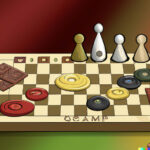Classical board games have stood the test of time, remaining a beloved pastime for people of all ages. From the strategic challenges of chess to the competitive nature of backgammon, these games continue to capture the interest and imagination of players around the world. The enduring appeal of classical board games lies in their ability to bring people together and provide a timeless form of entertainment.
These games have a rich history that dates back centuries, with origins rooted in different cultures and civilizations. From ancient Egypt to medieval Europe, classical board games have played a significant role in human social interaction and intellectual development. As technology continues to advance, classical board games remain relevant, serving as a reminder of our collective heritage and offering an alternative way to engage with others beyond digital screens.
In this article, we will explore the fascinating world of classical board games, delving into their history, importance, different types, notable examples, and even modern adaptations. Whether you’re a seasoned player or new to these timeless pursuits, there’s something for everyone to discover and enjoy in the world of classical board games.
History of Classical Board Games
Classical board games have been a part of human history for centuries, with some of the most popular games having origins dating back to ancient civilizations. The history of classical board games is rich and diverse, reflecting the cultural and societal contexts in which these games originated. Let’s take a closer look at the origins of some of the most iconic classical board games, including chess, backgammon, and Go.
1. Chess: One of the oldest and most strategic board games in existence, chess is believed to have originated in India during the Gupta Empire around the 6th century AD. The game then spread to Persia and subsequently to the Arab world and Europe, evolving into its modern form over time. With its intricate rules and emphasis on strategic thinking, chess has remained a beloved classic throughout history.
2. Backgammon: Dating back over 5,000 years, backgammon is one of the oldest known board games. Its origins can be traced to ancient Mesopotamia (modern-day Iraq), where it was originally known as “Senet.” Over time, backgammon made its way to the Roman Empire and eventually spread across Europe. Renowned for its blend of skill and chance, backgammon has maintained its appeal across cultures for millennia.
3. Go: Originating in China over 2,500 years ago, Go is considered one of the oldest classical board games still played today. Known for its simple rules yet complex strategies, Go gained popularity in East Asia before spreading to other parts of the world. Its enduring legacy as a game requiring profound thought and spatial awareness has cemented its status as a timeless classic.
These classical board games have stood the test of time, captivating players throughout history with their unique challenges and intellectual stimulation. Understanding their origins provides invaluable insight into their enduring appeal and cultural significance.
Importance of Classical Board Games
Classical board games have stood the test of time, captivating players across generations and cultures. Beyond just providing entertainment, these games also offer numerous cognitive and social benefits that contribute to their enduring popularity.
Cognitive Benefits
Playing classical board games requires critical thinking, problem-solving, and decision-making skills. Games like chess, for example, necessitate forward planning and the ability to anticipate an opponent’s moves. This mental exercise can help improve cognitive function, enhance concentration, and even stave off cognitive decline in older adults. Additionally, board games often involve mathematical concepts such as counting spaces or calculating probabilities, which can strengthen numerical skills in players of all ages.
Social Benefits
In addition to their cognitive advantages, classical board games also foster social interaction and communication. Whether it’s strategizing with teammates in a cooperative game or engaging in friendly competition with opponents, playing board games provides opportunities for bonding and building relationships.
These games teach sportsmanship, encourage teamwork, and facilitate the development of social skills such as turn-taking, negotiation, and conflict resolution. With the rise of multiplayer online versions of classical board games, players now have the chance to connect with others from different parts of the world, further enhancing their social experiences.
Educational Value
Many classical board games offer educational benefits as well. Games like Scrabble reinforce language and vocabulary skills while geography-based games like Risk or Settlers of Catan can increase players’ knowledge about different regions of the world. By seamlessly combining learning with play, these board games appeal to educators who recognize their potential as effective teaching tools. As a result, some schools have incorporated classical board games into their curriculum as a means of engaging students in interactive learning experiences.
Different Types of Classical Board Games
Classical board games come in various categories, each offering a unique gaming experience. Strategy games are one of the most popular types of classical board games, and they require players to use their intellect and foresight to outmaneuver their opponents. Examples of strategy games include Chess, Risk, and Settlers of Catan. These games often involve long-term planning and decision-making skills, making them a favorite among individuals who enjoy intellectually stimulating challenges.
War games are another category of classical board games that simulate military conflicts and tactics. These games often have historical settings and require players to strategize their movements and anticipate the actions of their adversaries. Notable war games include Axis & Allies, Memoir ’44, and Twilight Struggle. War games appeal to history enthusiasts and those who enjoy competitive gameplay with high stakes.
Abstract board games focus on pure strategy and tend to have simple rules but complex gameplay. Games such as Go, Mancala, and Checkers fall into this category.
Abstract board games test players’ ability to think critically and plan several moves ahead while maintaining a strong sense of spatial awareness on the game board. Overall, the different types of classical board games cater to a wide array of interests and skill sets, ensuring that there is something for everyone in the world of traditional tabletop gaming.
| Category | Examples |
|---|---|
| Strategy Games | Chess, Risk, Settlers of Catan |
| War Games | Axis & Allies, Memoir ’44, Twilight Struggle |
| Abstract Games | Go, Mancala, Checkers |
Notable Classical Board Games
When it comes to notable classical board games, there are a few that stand out for their unique features and enduring popularity. These games have stood the test of time and continue to be beloved by people of all ages around the world. Here are some of the most iconic classical board games and what makes them special:
- Chess: Chess is a two-player strategy game that has been played for centuries. Its complex rules and emphasis on tactics and foresight make it a favorite among enthusiasts who enjoy mental challenges.
- Backgammon: This ancient game is a combination of luck and skill, as players roll dice to move their pieces around the board. It’s known for its fast-paced action and unpredictable outcomes.
- Go: Originating in China over 2,500 years ago, Go is an abstract strategy game that involves capturing territory by surrounding your opponent’s pieces. Despite its simple rules, it offers an incredible depth of strategy.
These notable classical board games have withstood the test of time due to their ability to engage players in strategic thinking, decision-making, and social interaction. Whether played casually or competitively, these games continue to be enjoyed by millions worldwide.
How to Play Classical Board Games
Playing classical board games is a timeless and enjoyable activity that has been around for centuries. While each game has its own specific rules and strategies, there are some general guidelines that can be helpful when getting started with classic board games.
One of the most important things to keep in mind when playing these games is to familiarize yourself with the rules and understand the objective of the game. This will allow you to fully enjoy the experience and make informed decisions during gameplay.
For popular strategy games like chess, it’s essential to understand how each piece moves and their respective values. Knowing how to spot potential threats and plan ahead are key components of mastering this game.
In backgammon, players must be familiar with how to move their checkers based on dice rolls, as well as knowing when to strategically use the doubling cube. As for Go, understanding the concept of controlling territory and capturing stones is crucial in becoming proficient at this game.
In addition to learning the rules, becoming familiar with common tactics and strategies can greatly improve one’s skill level in classical board games. For example, developing a solid opening strategy in chess or creating effective formations in war games like Risk can give players a competitive edge. Overall, playing classical board games not only requires knowledge of the rules but also strategic thinking and decision-making skills.
| Classical Board Game | Key Strategy/Rule |
|---|---|
| Chess | Understanding each piece’s movement |
| Backgammon | Moving checkers based on dice rolls |
| Go | Controlling territory and capturing stones |
Modern Adaptations of Classical Board Games
Evolution of Traditional Games
Classical board games have not remained static over the years. They have adapted to fit into modern society, with new versions being created and existing ones evolving to incorporate modern technology. Many traditional board games, such as chess and backgammon, have been given a new lease on life through digital platforms. This evolution has allowed the games to reach a wider audience and be enjoyed by people across the world.
Digital Platforms and Apps
The introduction of digital platforms and apps has breathed new life into classical board games. From mobile apps that allow users to play against friends or computer opponents to online multiplayer platforms, classical board games have become more accessible than ever before. Players can now enjoy their favorite traditional board games from the comfort of their own homes or even on the go, thanks to the convenience of digital adaptations.
Modern Versions and Variants
In addition to digital adaptations, modern versions and variants of classical board games have also emerged. These may involve changes in rules, game mechanics, or even themes while still retaining the fundamental aspects that make these games timeless classics. Some classic board games have also been reimagined in different forms such as card games, dice games, or even physical adaptations with enhanced graphics and materials.
As technology continues to advance, it is likely that classical board games will further evolve and adapt to the needs and preferences of modern society. Whether through virtual reality experiences or innovative gameplay mechanics, classical board games are expected to continue captivating players for generations to come.
The Future of Classical Board Games
In conclusion, classical board games have stood the test of time and continue to be an important part of human culture and social interaction. As we have traced the history, importance, and different types of classical board games, it is clear that these games offer numerous cognitive and social benefits. From enhancing strategic thinking to promoting social bonding, these games have proven to be timeless forms of entertainment and education.
Looking ahead, the future of classical board games appears promising as they continue to remain relevant in a world dominated by digital technology. While modern adaptations of these games have gained popularity, there is also a growing interest in preserving the traditional forms of classical board games. Innovations such as incorporating new themes, designs, and gameplay mechanics are reshaping the landscape of classical board games, making them more accessible and appealing to a wider audience.
Overall, classical board games have transcended generations and cultural boundaries, making them cherished forms of entertainment for people around the world. As we move forward, it is clear that these beloved games will continue to adapt and evolve while retaining their timeless charm. Whether played on a physical board or through digital platforms, classical board games are here to stay, offering joy, intellectual stimulation, and camaraderie for many years to come.

I love playing all kinds of games – from classics like Monopoly to modern favourites like Ticket to Ride.
I created this blog as a way to share my love of board games with others, and provide information on the latest releases and news in the industry.





